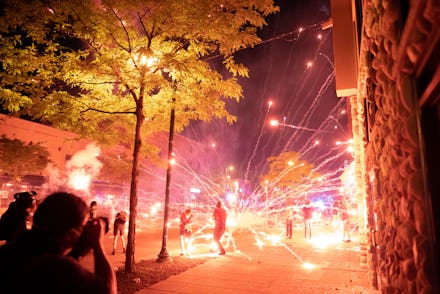This is what it looks like when no one is in control

I woke up this morning with smoke on the horizon, the sound of helicopters in the air, and the lingering sense that no one knows what's going to happen next.
For the past three nights, Minneapolis (and as of Thursday, St. Paul as well) has been rocked by protests — many peaceful, some violent — over the police killing of George Floyd, an unarmed Black man who was handcuffed, restrained, and then choked for several minutes by a police officer who kneeled on his neck until he stopped moving. The reason for all this: He was suspected of using a counterfeit $20 bill.
The images have been striking: a police station burned and gutted; non-violent protesters bombarded with chemical irritants without provocation; thousands massed — and masked, because let's not forget the raging pandemic — on the streets to call for justice and accountability. And yet, throughout it all, my admiration for the protesters who are risking their health and safety to demand a better community for themselves and their neighbors has been matched only by a sense that our elected leaders and public servants have been AWOL, failing in their most fundamental obligation to simply be present in the places they represent.
To get a sense of just how profound that leadership vacuum is, listen to these Minneapolis police officers attempt to explain to a bystander just who is in charge at the moment:
"I haven't heard anything, sir," one officer explains, when asked if he'd received any "orders from above" as to what he should be doing beyond the menial task of putting up barriers at a local bank.
For an even more blatant example, here are the Minneapolis police essentially abandoning the 3rd precinct headquarters that have been a focal point of the recent protests, as crowds move in.
Minnesota Gov. Tim Walz (D) has essentially admitted that parts of Minneapolis have been abandoned by the city. He then placed the blame squarely on Minneapolis and St. Paul's mayors for their inadequate responses to the protests.
Minneapolis Mayor Jacob Frey (D), meanwhile, has surfaced for a few weepy press conferences and an appearance on Rachel Maddow's MSNBC show, but has been largely absent from the actual streets where his constituents have massed for the past several days. Even the Minnesota National Guard has complained that they weren't given much of a plan of action by the City of Minneapolis, after they were deployed to augment the (fleeing) police department. (St. Paul Mayor Melvin Carter (D), for his part, has handled matters better in his city.)
Riots are, as Martin Luther King explained more than 50 years ago (while speaking in the Twin Cities, no less), "the language of the unheard." And to the extent that riots are, like languages, a way of expressing agency over — and outside of — traditional power structures, that conversation has been largely one-sided since the protests began Tuesday night. The protesters are speaking, but increasingly, it seems as if no one in City Hall is listening, much less answering them back.
All this lends itself to the understandable conclusion that no one is actually in control here.
Don't misunderstand me: I'm not looking for a police department with an extensive history of racism to return to South Minneapolis. I'm not thrilled by images of National Guard soldiers standing across Lake Street. I'm terrified when the American president threatens to send troops to shoot protesters, echoing the language of a southern sheriff during the civil rights protests of the '60s.
If there is an answer to what's happening in Minneapolis — both to Floyd's death, and to the ensuing protests — it will not come from the heavy hands of political reactionaries, or politicians in general. Nor can it come solely from the community — ordinary citizens, civic and faith leaders, organizers, and business owners.
Progress happens as a result of dialogue, of conversation — of, dare I say, a discourse between stakeholders. That can't happen when one side of that conversation — the side, incidentally, which is responsible for upholding the very structures that lent themselves to creating the inequality being protested against in the first place — is largely absent, and when they do come forward have simply engaged in a circular firing squad of finger-pointing.
On Friday, nearly a week after Minneapolis Police Officer Derrick Chauvin was filmed kneeling on Floyd's neck until he fell unconscious, Minnesota Department of Public Safety Commissioner John Harrington announced that Chauvin had been taken into custody by state's Bureau of Criminal Apprehension. In the days between Chauvin killing Floyd and his being arrested, dozens of buildings were burned, stores were looted, and at least Black journalist and his camera crew were arrested simply for standing in the street — a cascading series of events that could have been mitigated in no small part if the city had simply acted with the speed and judiciousness expected in the aftermath of a unambiguously awful, avoidable death.
Minneapolis, and with it, the fight for justice and equality in general, is in largely uncharted territory. From the looks of it, the people elected to help lead their communities through times like these aren't willing to do their most basic job: Be there.